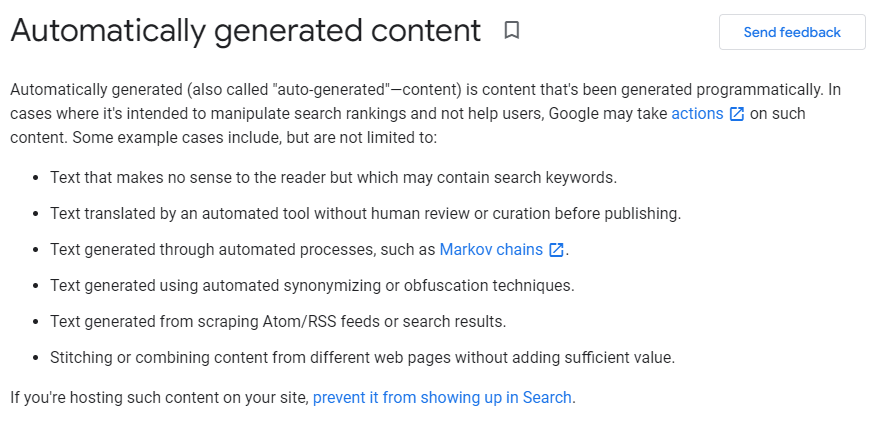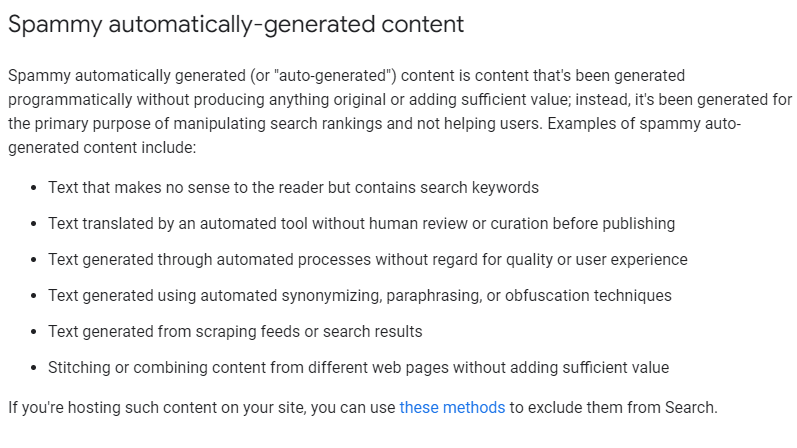Google has traditionally been against automatically generated content (AGC) stating that it is against their webmaster guidelines and falls into the category of spam.
Given AI written content is also auto-generated, does Google considers AI-written content spam and violating guidelines? Has the position changed over time?
As per the latest updates, the position seems to have changed. Let’s explore Google’s current position and updates over time in this article.
What is Automatically Generated Content (AGC)?
Google typically defines automatically generated content (AGC) as content that has been generated programmatically without creating anything original or adding value. Instead, it’s generated for the primary purpose of manipulating search rankings and not helping readers.
Here is a screenshot of AGC in March 2022:


An example of AGC would be a website that uses software to generate articles on various topics by using a database of pre-written sentences and phrases, with no human review done before publishing. These articles
- are not written by humans
- are not reviewed by humans
- do not have any value or meaning
- only have keyword stuffing in them
- intend to manipulate search engine rankings
It is obvious that neither users nor Google would want to see these articles.
Is AI written Content Considered Automatically Generated Content (AGC)?
In April 2022, Google’s Search Advocate John Mueller stated that Google’s position on automatically generated content (AGC) has always been clear. He said that AGC, regardless of how it is produced including AI and machine learning tools, is still considered spam by Google.
He stated, “For us, these would, essentially, still fall into the category of automatically generated content which is something we’ve had in the Webmaster Guidelines since almost the beginning. And people have been automatically generating content in lots of different ways. And for us, if you’re using machine learning tools to generate your content, it’s essentially the same as if you’re just shuffling words around, looking up synonyms, or doing the translation tricks that people used to do. Those kinds of things. My suspicion is maybe the quality of content is a little bit better than the really old-school tools, but for us, it’s still automatically generated content, and that means for us it’s still against the Webmaster Guidelines. So we would consider that to be spam.”
It was clear that Google considered AI-written content against its guidelines and didn’t want people to use it if they wanted to rank in Google.
What is Google’s Current Position on AI Written Content?
In November 2022, Google shared its position on AI-Written content through its SearchLiaison Twitter account, stating that content created primarily for search engine rankings is still against its guidelines.
But content that is helpful and created for people is not an issue. This shift in position shows that Google is becoming accepting of AGC as long as it provides value to users.


Google also updated its definition of AGC to “spammy automatically-generated content” to stress that the primary purpose of any content should be to help users and not manipulate search rankings.


This new definition includes a focus on human review. The definition has also added a term to avoid “paraphrasing” to emphasize that Google advises against the use of article rewriters to rewrite AI-written content only to avoid AI detection and manipulate search ranking.
Introducing New Guidelines Called E-E-A-T
In December 2022, Google updated its guidelines by adding an extra “E” for “experience” to the E-A-T (Expertise Authority Trustworthiness) criteria for search rankings.
This change, called E-E-A-T (Experience Expertise Authority Trustworthiness), should be used by content writers as a guideline and is also intended to ensure that the results provided by Google’s search ranking systems are helpful and relevant.
Here’s an example of how E-E-A-T (Experience, Expertise, Authority, Trustworthiness) might apply to a website. Let’s take an example of a website that provides medical advice and information about health conditions.
- Experience: The website is run by a team of medical professionals with years of experience in the medical field. They share their professional experience of working with patients and provide practical advice.
- Expertise: The team of medical professionals have the right qualifications and credentials, and have a sound understanding of the subject matter they write about.
- Authority: The website is frequently cited as a dependable source of information by other reputable websites and media outlets.
- Trustworthiness: The website shares factually correct content and only links to other websites that can be trusted. Any information shared on this website can be relied on.
By having all of these criteria in place, it can be said that the website is providing helpful and relevant information to users. So, it would be considered to have good E-E-A-T by Google.
Final Words
While Google has always been against AGC, it has become accepting of quality AI content as long as it provides value to users. The updated guidelines and definitions of AGC and E-A-T show this change in position. However, it is important for creators to keep in mind that AI-written content
- is original and unique
- should not be used to manipulate search rankings
- should not be posted without human review
- should provide value to users
- shows the experience and expertise of the author
So, Google doesn’t hate AI-written content as long as it is used keeping people, not the search engines, in mind.


